Prefer to listen instead? Click here for the audio version of this blog on Spotify.
A monk with a big yikes past
Perhaps of all the stories we’ve read so far in this series, Abba Moses the Black (also known as “the Robber” or “the Strong”) has one of the most cinematic—and most surprising—transformations.
And when I say cinematic, I don’t mean sweet Kevin Sullivan’s 1985 Anne of Green Gables. I mean Quentin Tarantino-level chaos—think violence, tension, and total moral unraveling. But what makes Moses’ story unforgettable isn’t just his past—it’s how he persevered in the present. Through humility. Through repentance. Through grace.
Most scholars believe Moses was originally from northeastern Africa, possibly Nubia or Sudan. He’s called “the Black” not only because of his African heritage and dark skin, but also—according to some interpretations—because he emerged from a life of deep darkness into the light of holiness. A man once feared for his violence would later become known for humility, repentance, and peace.
But his former life? It was right up there with St Paul in the category for holy men with a BIG YIKES history.
According to Coptic and Ethiopian Christian tradition, Moses was originally a slave to a pagan official or priest—a sun-worshiper, which wasn’t uncommon in rural parts of Egypt during that era. But legend has it, he was so violent and unmanageable that even his master cast him out.
Take a second to let that sink in: his behavior was so awful that people who considered him their property wanted nothing to do with him.
So, set loose and unchecked, Moses dove headlong into a life of crime.
He formed and led a gang that pillaged and murdered, terrifying people who traveled along the Nile River. The Coptic Synaxarium (a liturgical book of saints’ lives used by the Coptic Orthodox Church of Alexandria, one of the oldest Christian communities in the world) says he indulged in eating, drinking, robbery, murder, and “committing all evil.” People were terrified of him, and no one dared challenge him.
And yet, he wasn’t fully lost. The Synaxarium also preserves a fascinating glimpse of his interior life. It’s said that he would often look up at the sky and speak to the sun: “O Sun! If you are God, let me know it. And you, O God, whom I do not know, let me know you.”
Even in his chaos, Abba Moses was searching. He was asking questions that mattered. And God—who never stops pursuing our hearts—was listening.
One day, whilst crying out to the sun, he heard a voice say, “The monks of Wadi El-Natroun know the real God. Go to them and they will tell you.”
And he did—immediately. He stood up, strapped on his sword, and headed to find these monks who knew the true God.
On his way, he came across St. Isidore the priest, who would later go on to become one of his great teachers. St. Isidore was, obviously, terrified because a big strong dude with a sword just approached him. But when Abba Moses told Isidore he wanted to learn more about God, the priest didn’t hesitate.
In this post, we’ll follow Abba Moses through the wild terrain of his story as he shows us what it means to persevere in the wilderness. In him, we see that no past is too dark, no wilderness too vast—for the one who walks with humility, embraces repentance, and clings to God with tenacious faith.
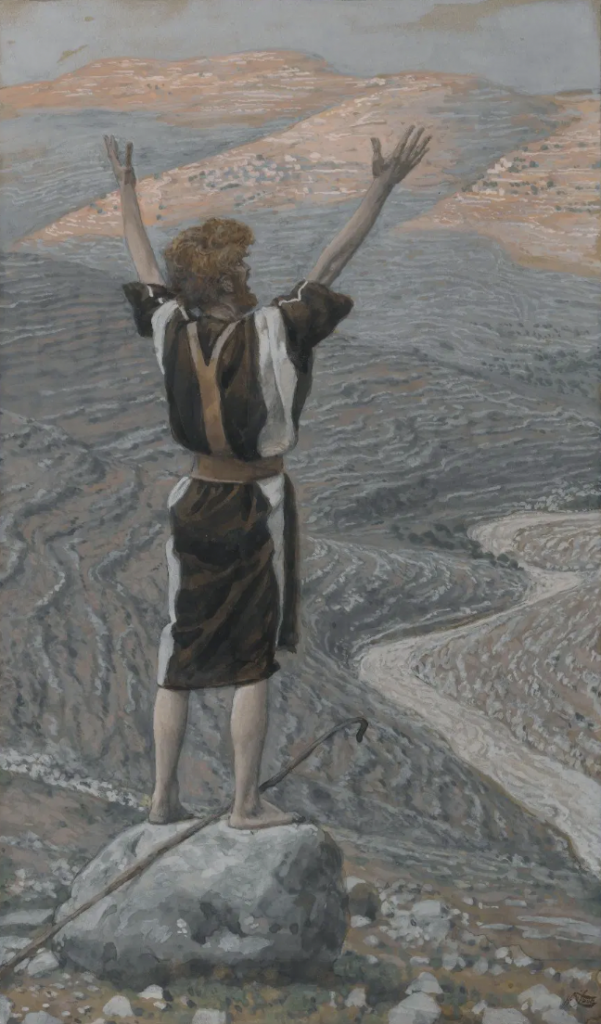
Tenacious holiness
I’m going to go out on a limb here and guess that you probably are not a former gang leader (no, your children do not count). But the seeming severity of our sins says nothing about the sway and pull they have on us.
Abba Moses’ story is one of incredible ferocity and redemption. The Coptics say, “This saint took the Kingdom of Heaven by force, exactly as our Lord Jesus Christ said: The Kingdom of Heaven suffers violence, and the violent take it by force. (Matthew 11:12).”
And by that they don’t mean he forced his way into the Kingdom with guns blazing. In this context, “violence” is spiritual intensity, not physical aggression. Jesus is talking about people who pursue the Kingdom of God with fierce, relentless determination—who are willing to wrestle with their own sin, fight temptation, and persevere in faith, even when it’s incredibly hard.
And Abba Moses fought hard to become holy.
He didn’t have an easy or tidy conversion. He came from a life of violence, addiction, and sin. And even after turning to Christ, he struggled intensely with temptation, anger, and self-discipline. But he never gave up. He battled—not others, but himself—to live in God’s grace. His story reminds us that holiness isn’t about having a spotless past, but about taking the next faithful step—again and again—with deep trust in God’s mercy.
Because conversion doesn’t mean instant perfection. But it does mean real forgiveness. Abba Moses believed that he was truly forgiven for all he had done. And that belief—bold, trusting, and grounded in grace—is what gave him the courage to begin again, over and over.
In the sacrament of Reconciliation, Christ offers us what Abba Moses trusted in: complete absolution. When the priest, acting in persona Christi, speaks the words of forgiveness, our sins are wiped away. Not minimized. Not half-forgiven. Gone. Forever.
We often forget that first part. We focus so much on the wreckage left behind—on the pain our sin caused or the consequences we still carry—that we lose sight of what God has already done: forgiven us.
As the Catechism reminds us, absolution takes away sin, but it doesn’t always repair the disorder sin has caused (CCC 1459). The effects of sin may still ripple outward. The memories may linger. The grief may remain. But the guilt? That’s not ours to carry anymore.
Abba Moses fought for holiness with the same intensity he once fought in sin. He pursued God fiercely, refusing to let his past define him. He showed us that sanctity doesn’t mean spiritual perfection—it means having contrition for what we’ve done and returning to the Father again and again.
He picked up his cross, not just once, but daily. And that is something we can all borrow as spiritual encouragement on our own journey through the wilderness.
But it’s a challenge for sure.
Satan, the accuser, stands ready before us, armed with every failure, every fall, every moment we’ve felt furthest from God. He is the great rememberer, dragging our sins back into view and trying to convince us they still define us. He wants us stuck—convinced we’re no better than the wreckage we’ve caused, that we’re too far gone to change.
And he doesn’t whisper—he shouts, bellows, and rages.
Remember when you slept with that guy in college who wasn’t your husband?
Remember when you yelled at your kids and threw the laundry basket across the room?
Remember when you gossiped about that mom at the co-op last week?
Remember when you hate-watched Instagram stories so you could feel superior?
Remember how you scrolled your phone for an hour instead of spending time with God?
Remember when you hated your best friend for getting pregnant because you struggle so much?
Remember when you told someone you’d pray for them…and didn’t?
Remember when you resented your husband for not reading your mind—and punished him with silence?
Remember when you watched and masterbated to porn?
Remember that bitterness you still carry, the envy you won’t admit, the ways you check out when it all feels too hard?
Lucifer prowls and waits, watching for our moments of weakness. And when they come, he is quick to pounce—holding up a litany of our failures, reminding us of who we’ve been, what we’ve done, and all the ways we’ve fallen short of the woman God calls us to be.
But here’s the truth he cannot bear to hear:
Jesus is not holding a list. He holds up two nail-pierced hands.
And He says to us, “My sweet, beautiful girl, I became a man to seek you out and take on your sins. I wanted your debt. And in exchange, I want you to humbly, confidently claim the inheritance that is yours. I give you everything—my life, my actions, my mother, my death—all of it is yours, given from the unshakeable love I bear for you.”
This is the scandalous, beautiful heart of the Gospel. Satan reminds. Christ redeems.
Because if Satan is the great rememberer, God is the great forgetter.
In the sacrament of Reconciliation, God doesn’t simply glance past our sins—He erases them. Not because He’s careless, but because His mercy is complete. Yes, we may still carry the effects, the wounds, the consequences of our sin—but the sin itself? It is gone. Forever.
He loves us. He loves those we’ve hurt. And in that love, He calls us not to wallow in shame but to rise into restoration. Through penance, He invites us to repair what we can. But He does not ask us to relive what He has already redeemed.
Where Satan accuses, Christ stands in the gap—bleeding, rising, victorious.
Where Satan exposes every wound, Christ binds them with mercy.
Where Satan screams, “Unworthy!” Christ whispers, “Mine.”
Where Satan drags us to shame, Christ pulls us to His sacred, burning heart.
“Who shall bring a charge against God’s elect? It is God who justifies… Christ Jesus is the one who died—more than that, who was raised—who is at the right hand of God, who indeed intercedes for us.” (Romans 8:33–34)
The list is real. The sin was real.
But the Cross is stronger. And the blood of Christ has already blotted it out.
Abba Moses shows us how to respond when the enemy hisses, “Remember when…”
With quiet confidence, we can say: “I do. But Jesus remembers me redeemed.”
That kind of response takes perseverance. The kind born not from perfection, but from ongoing repentance and unwavering faith. We keep reaching for God’s mercy. We rise. We fall. We rise again. Because this is the race set before us—to run with endurance, eyes fixed on Christ, until we wear the crown of glory. (Hebrews 12:1)
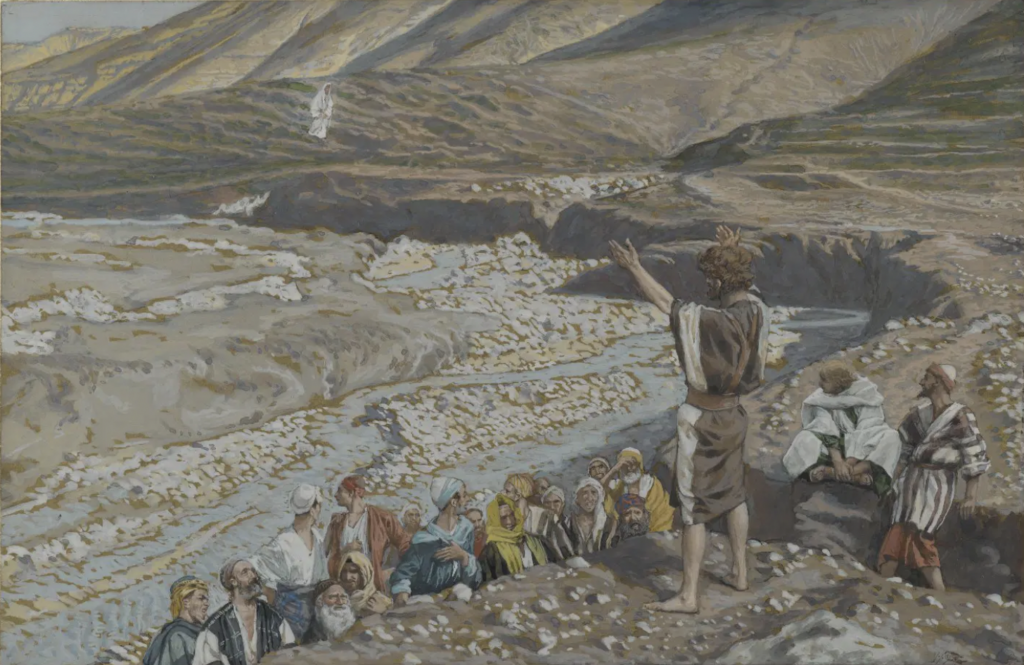
The key to perseverance
We often think perseverance looks like grit, toughness, or sheer willpower—but in the desert (AKA all the time while we reside on earth), it looks more like humility. And Abba Moses knew that, and modeled it, better than most.
He didn’t push through the wilderness by proving his worth. He persevered by laying down his pride and letting God be his defender. And not just the defender…the one always waiting for us.
In his Daily Mass Homily on March 28, 2014, Pope Franics said, “The God of mercy; he does not tire of forgiving. We are the ones who tire in asking for forgiveness, but he does not tire.”
Pope Francis reminds us that God is always ready and willing to forgive—but we often grow weary of asking. Abba Moses shows us what it looks like to persevere through that weariness, to keep choosing humility even when shame and rejection try to drive us away from grace.
What you’re about to read is one of the stranger, more uncomfortable stories from The Sayings of the Desert Fathers. It’s short, startling, and more soul-punch than parable. Let’s read it first, then unpack what’s going on:
“They used to say when Abba Moses was one of the clergy he wore a long outer garment and that the Bishop said to him, “Behold you are all white, O Abba Moses.” The elder said to him, “Is the abba within or without?” And again, wishing to test him, the Bishop said to the clergy, “When Abba Moses goes into the sanctuary drive him out, follow him, and hear what he says.” So when he went into the sanctuary, they rebuked him and drove him out saying, “Go outside, O Ethiopian!” After he left, he said to himself, ‘They treated you rightly, O you whose skin is dark and black. You shall not go back as if you were a white man.’”
Oof, right? That sounds deeply problematic upon reading it, but like many sayings of the Desert Fathers, it’s meant to punch you in the soul more than explain itself outright. So, what’s really going on in this story?
Abba Moses the Black, once a criminal, is now ordained clergy (which is a super big deal for a man of his background).
He’s wearing a white outer garment, symbolizing purity and holiness.
A bishop comments: “Behold, you are all white, O Abba Moses.”
That could sound like a compliment, maybe? But Moses flips it into a spiritual reflection: “Is the abba within or without?” Translation: “Are we talking about what I look like—or who I actually am inside?”
Then the bishop tests him further, asking the clergy and parishioners to publicly insult and drive Moses out of the sanctuary—mocking him with racial language (“Go outside, O Ethiopian!”) to see how he will respond.
Instead of reacting with anger, Moses responds with humility and detachment, saying: “They treated you rightly, O you whose skin is dark and black. You shall not go back as if you were a white man.” Translation: “They were right to treat you this way—you are still the same man, dark and sinful. Don’t pretend to be something you’re not. Don’t go back acting like you’re pure or elevated.”
Now, this story is deeply uncomfortable—especially today—and it should be. It’s not an endorsement of racism or abuse, but rather a window into how Abba Moses carried both spiritual authority and profound humility, even when faced with public rejection and injustice.
It’s also striking for women today, especially those who feel constantly scrutinized or pressured to defend their choices and experiences—whether it’s breastfeeding vs. formula, C-section vs. natural birth, homeschooling vs. public school, or any of the countless decisions that seem to define “good motherhood” in the eyes of the world.
But Abba Moses shows us that holiness isn’t about appearances or proving ourselves. It’s about inner transformation. When we’re secure in the love and mercy of God, we no longer need to justify ourselves or perform for others. True humility lets us absorb humiliation without losing our peace.
Let’s look at another instance of radical humility that really cuts deep.
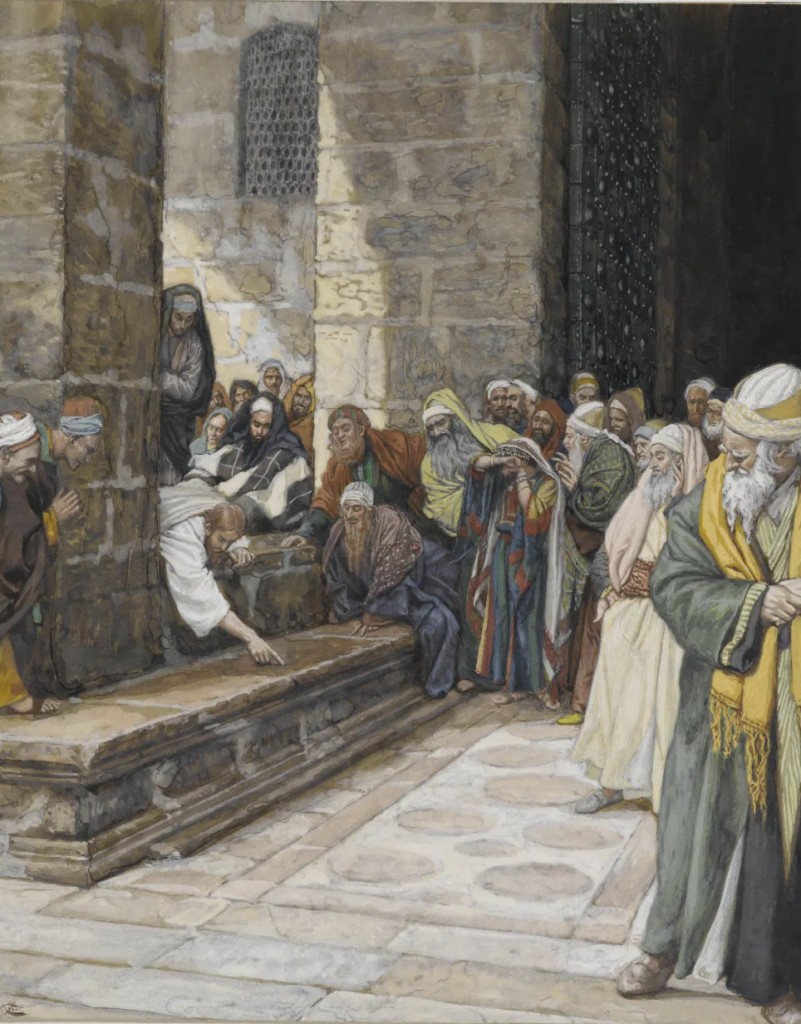
The jug or the scorecard?
From The Sayings of the Desert Fathers:
“A brother at Scetis committed a fault. A council was called to which Abba Moses was invited, but he refused to go to it. Then the priest sent someone to say to him, ‘Come, for everyone is waiting’ for you. So he got up and went. He took a leaking jug, filled it with water and carried it with him. The others came out to meet him and said to him, ‘What is this, Father?’ The old man said to them, my sins ran out behind me, and I do not see them, and today I am coming to judge the errors of another.’ When they heard that they said no more to the brother but forgave him.”
Can you imagine if your sins were visible like that? Trailing behind you—every white lie, jealous thought, flare of anger, or judgment whispered under your breath? If they followed you into the pickup line, into Mass, into the quiet of your kitchen—would it change how you looked at someone else?
That’s what Abba Moses understood. His humility wasn’t hypothetical — it was embodied. “My sins run out behind me, and I do not see them… and today I am coming to judge the errors of another?” That question still echoes.
We may not carry jugs, but we do carry invisible scorecards.
We measure ourselves — and others — quietly, constantly. Who bounced back the fastest? Who breastfeeds, or doesn’t? Whose kids eat kale, and whose kids are licking Goldfish off the floor? It’s not always malicious; sometimes it’s just the aching desire to know we’re doing okay. That we’re seen. That we matter.
And sometimes, that ache leaks out in ugly ways.
A gentle note before you read on: If birth stories are a sensitive or painful place for you, I see you. What I’m about to share touches on those wounds—but not to reopen them. I share this in hopes that you’ll find freedom, not shame; solidarity, not comparison. Stay with me.
A while back, I saw a mom on Instagram celebrating her unmedicated birth. She was beaming, proud, calling herself a warrior—and I flinched.
My first thought wasn’t joy for her, but instead, a bitter, “Try having an emergency c-section and taking care of twin babies in the NICU.”
Before I could catch it, my mind was racing—quietly tallying how much help she must have had and what her situation might be.
Hours later, I realized just how prideful and deeply wounded my thoughts were.
The truth?
I was grieving.
I was hurting.
I was still carrying the weight of a failed VBAC and the fear that maybe I hadn’t done it “right.”
I’d believed that strong women gave birth a certain way. And if I couldn’t, what did that say about me?
That’s the insidious nature of invisible scorecards. They don’t just push us to judge others—they push us to protect ourselves from shame.
But Abba Moses didn’t walk into that council with a list of justifications or credentials. He walked in with a leaky jug. He led with humility. And that freed everyone else to lay down their stones.
What if we did the same?
What if our worth wasn’t tied to how many kids we have, how we birthed them (or how they came into our family), how quiet they are at Mass, or how clean our kitchens are? What if we stopped performing for a crowd that’s just as tired and insecure as we are?
Because truthfully, we are dust.
And God knew that score. He settled it on Calvary.
Our goal should be to live in that humility.
Nowhere in my Bible does it say, “Come to Me, all you who meet this super specific and arbitrary standard of mom or woman holiness.”
It says: “Fear not, for I have redeemed you; I have called you by name, you are mine.” (Isaiah 43:1)
Notice how the prophet starts with fear?
He knows it rules us.
We’re terrified of not being enough. Of being overlooked. Of not having a seat at the table. Of failing quietly while someone else is being praised publicly. Of being forgotten. Unchosen. Unworthy.
But God doesn’t lead with condemnation. He leads with redemption. With belonging.
Not “you are perfect.”
Not “you are impressive.
Not “you had three under three.”
Just: You are Mine.
That’s what Abba Moses understood when he poked holes in his jug. He didn’t enter that space to prove anything—not his strength, not his virtue, not his worth. He carried his weakness in plain sight. It was the way of humility—the same way walked by Mary, and by Christ Himself.
Abba Moses walked into a room of judgment not with arguments or defenses, but with his own mess and he laid it down. He didn’t whip out his scorecard. He didn’t compare, deflect, or perform. He simply acknowledged the truth: I am a sinner, too.
That’s what true humility looks like—not self-loathing, but an honest awareness of who we are and who God is. Moses lived it with his jug. Mary lived it with her fiat. Both show us that humility isn’t about minimizing our worth; it’s about surrendering everything to the One who made us.
We cannot run the race set out for us if we’re constantly elbowing others aside just to prove we belong. That isn’t the way of Christ—it’s the noise of insecurity pretending to be purpose.
We run free when we remember the ground at the foot of the Cross was leveled by the blood of Jesus Christ. No one gets to climb higher there. No one needs to. We’re not racing each other—we’re running with each other, toward Home.
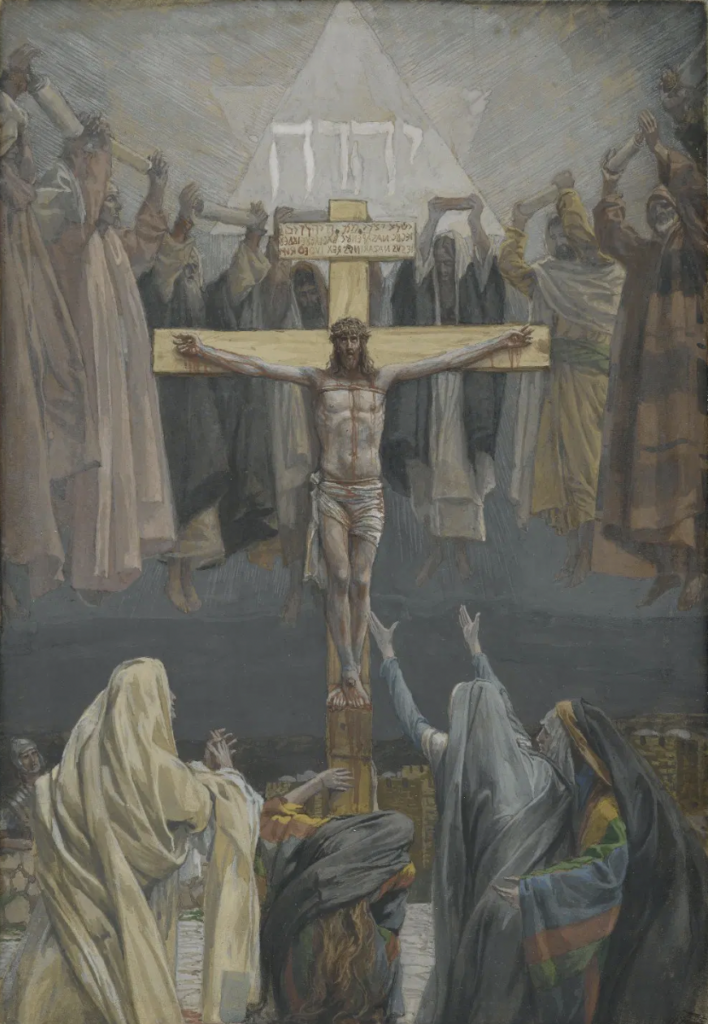
Those who are with us
Sometimes, in our test of endurance on this side of Paradise, we’re not called to advance, advance, advance.
Sometimes we’re called to stay right where we are—rooted in this season, in this moment, in the cell where God has placed us.
And God, in His mercy, never asks us to stay alone.
Here’s a beautiful illustration of exactly what that means from Abba Moses:
“It happened that Abba Moses was struggling with the temptation of fornication. Unable to stay any longer in the cell, he went and told Abba Isidore. The old man exhorted him to return to his cell. But he refused, saying, ‘Abba, I cannot.’ Then Abba Isidore took Moses out onto the terrace and said to him, ‘Look towards the west.’ He looked and saw hordes of demons flying about and making a noise before launching an attack. Then Abba Isidore said to him, ‘Look towards the east.’ He turned and saw an innumerable multitude of holy angels shining with glory. Abba Isidore said, ‘See, these are sent by the Lord to the saints to bring them help, while those in the west fight against them. Those who are with us are more in number than they are.’ Then Abba Moses, gave thanks to God, plucked up courage and returned to his cell.”
I love this story so dang much.
Too often, we believe that we are in this race by ourselves. I mean, I don’t know about you, but Gabriel the Archangel has never showed up at my house to fold the undergarments. St Ambrose has yet to empty my dishwasher.
But even if we can’t see them, we are not alone. Not even close. And it is not up to us to lead the charge.
God is the Lord of Armies. He commands battalions of angels and spiritual beings we’ve never beheld. The saints are generals—battle-hardened from their own time on earth—interceding with prayers of defense and support. Help is all around us, seen and unseen.
The great lie is that we must depend solely on ourselves—that our wit, might, and endurance are what will win the fight.
The answer to this?
Humility. (Who could’ve guessed?!)
When we’re tempted to put our trust in our own strength, God reminds us—sometimes quite dramatically—exactly who’s running the show. Just ask Job (I dare you to read this out loud to yourself):
“Where were you when I laid the foundation of the earth?
Tell me, if you have understanding.
Who determined its measurements—surely you know!
Or who stretched the line upon it?
On what were its bases sunk,
or who laid its cornerstone
when the morning stars sang together
and all the heavenly beings shouted for joy?
Or who shut in the sea with doors
when it burst out from the womb?
when I made the clouds its garment,
and thick darkness its swaddling band,
and prescribed bounds for it,
and set bars and doors,
and said, ‘Thus far shall you come, and no farther,
and here shall your proud waves be stopped’?
Have you commanded the morning since your days began,
and caused the dawn to know its place,
so that it might take hold of the skirts of the earth,
and the wicked be shaken out of it?
It is changed like clay under the seal,
and it is dyed like a garment.
Light is withheld from the wicked,
and their uplifted arm is broken.
Have you entered into the springs of the sea,
or walked in the recesses of the deep?
Have the gates of death been revealed to you,
or have you seen the gates of deep darkness?
Have you comprehended the expanse of the earth?
Declare, if you know all this.” (Job 38:4-18)
Girl, have you commanded the morning? Walked the ocean floor of your volition? Laid the foundations of the earth?
No? Me neither.
And that’s the whole point.
Abba Moses didn’t persevere because he was stronger than the temptation. He persevered because he remembered who God is—and who he wasn’t.
He didn’t stay in the cell because he summoned the courage on his own. He stayed because he trusted the One who commands angel armies. Because he believed that help would come. He believed that those who are with us are more than those who are against us.
And that’s what we’re invited into too.
Not a life of spiritual perfection. But a life of tenacity and humble persistence where we get back up, whisper “Jesus, help me,” and return to the work, the child, the room, the moment.
Trusting that God is mighty enough to command the heavens—and merciful enough to send help when we call.
You don’t have to feel strong to stay in the fight. You just have to remember who wins, and that you are a child of Victory.
Nothing is required of you except to repent again and again, ask God for new mercies each morning and daily bread, and cling to the rock and the hope that is higher than us all.
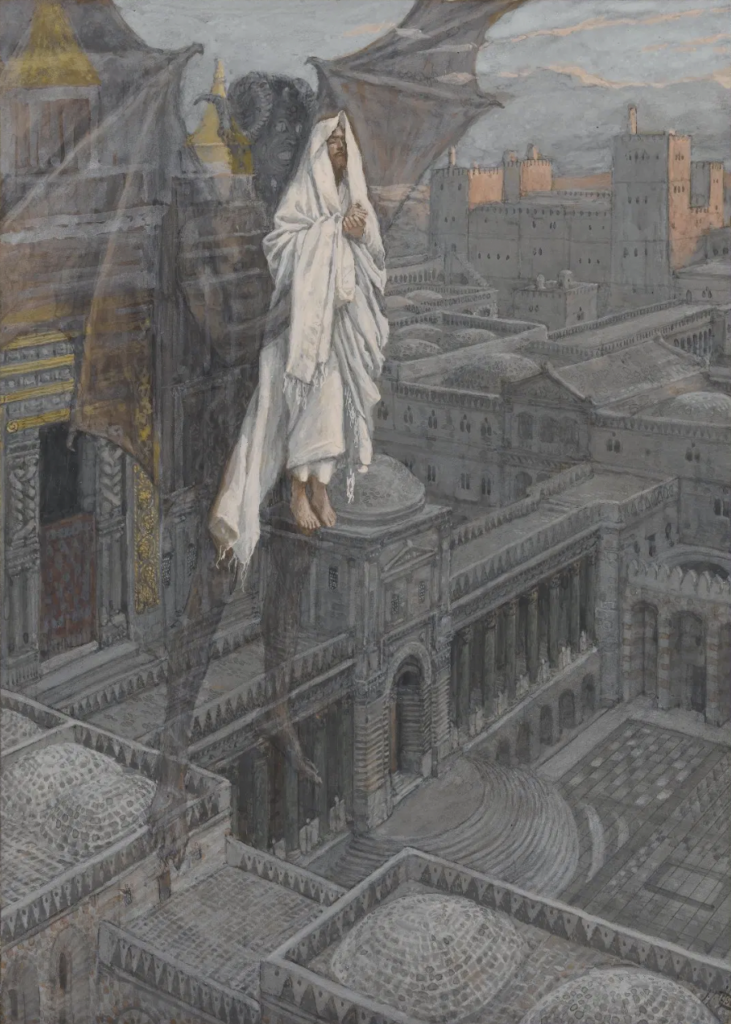
How to battle the lies of pride
Pride, that great enemy of humility, doesn’t always show up in our minds like Gaston chasing Belle—loud and boastful. It often hides behind exhaustion, resentment, comparison, or control. It sounds like self-pity or perfectionism.
It creeps into our minds in the middle of dishes and diapers, during tense conversations and lonely afternoons. And it whispers lies that make us believe we’re alone, overburdened, or better than someone else.
But pride is a poor companion in the wilderness.
If we want to persevere—really persevere—we have to challenge and replace the voice of pride with the voice of Truth.
Here are some of the lies pride whispers in our ears and what Scripture says back.
When pride says: I have to do everything myself.
Truth says: My grace is sufficient for you, for My power is made perfect in weakness.—2 Corinthians 12:9
When pride says: I deserve more recognition for everything I do.
Truth says: Whatever you do, do it all for the glory of God.—1 Corinthians 10:31
When pride says: If I don’t do it perfectly, I’ve failed.
Truth says: My power is made perfect in weakness.—2 Corinthians 12:9
When pride says: If I don’t control everything, it will fall apart.
Truth says: Be still and know that I am God.—Psalm 46:10
When pride says: I know what’s best.
Truth says: For my thoughts are not your thoughts, nor are your ways my ways, says the Lord. For as the heavens are higher than the earth, so are my ways higher than your ways and my thoughts than your thoughts.—Isaiah 55:8-9
Pride wants to isolate us. It wants us tangled in self-reliance, performance, and quiet superiority or shame. But Scripture tells a different story—a story of mercy for the weak, grace for the humble, and strength found not in perfection, but in surrender.
And no one shows us that better than Mary.
If Abba Moses shows us how to persevere with humility in the wilderness, Mary shows us how to carry that humility into the heart of God’s will—to become a vessel for Christ Himself.
Through the centuries, Mary has been given many titles that reflect the honor she bears as the Theotokos, the God-Bearer.
She has been called:
Virgin Most Humble
Handmaid of the Lord
Seat of Wisdom
Cause of Our Joy
Morning Star
But none of those names are accolades of what she has accomplished.
Virgin Most Humble is not a title she earned through ambition—it’s who she became through her surrender, by lowering herself before the Lord.
Handmaid of the Lord is the name of a servant who said yes with no guarantees, only faith.
Seat of Wisdom isn’t a pedestal. It’s a posture. It means she became the very place where Divine Wisdom—Christ Himself—rested. Not because she outsmarted anyone, but because she made room.
Cause of Our Joy points not to her accomplishments, but to the fruit of her presence. Joy followed Mary because she carried Jesus; she wasn’t full of herself but of Him.
Morning Star shines not with its own light, but with the promise of Someone greater coming soon. Mary’s light is beautiful because it reflects the One she carried, not because she tried to be seen.
More than any other human (aside, obviously, from Christ the God-Man) that has ever or will ever exist, Mary deserves the most adoration and the highest praise. And sure, we do venerate and celebrate what she did for all of humanity.
But she never takes it on as a mantle to herself. She is always pointing the way back to Jesus. And though we will fail 75 times before lunch today, that is what we must do. We ask for the grace to persevere, the protection of St Michael all those who fight the spiritual wars unseen, and the humility of Mary.
And when we’re tempted to pick up our scorecards. When we repeat things over in our minds like “No one sees what I am doing. I’m invisible. No one cares. I have no help,” know that those feelings are real but the truth is that the same Lord who sets boundaries for the ocean and set the cornerstone of the earth is not distant at all.
Our task is to step into the footpaths of Abba Moses, of Mary, and of Christ, and step-by-step, day-by-day, one present moment at a time, walk that race back Home.

Need a reminder when the lies get loud?
We created Let the Truth Answer as a simple, powerful guide to help you combat the quiet lies of pride with the louder voice of Scripture.
This printable set of cards speaks into the places where you feel unseen, overwhelmed, or not enough—and gently reminds you what God has already said.
Download the free card set now and keep truth close in the wilderness. Tape them to your mirror, tuck one in your Bible, or share them with a friend who needs encouragement.
Click here to download Let the Truth Answer
Read the rest of the Lenten series:
Into the Wilderness: A Lenten Pilgrimage with the Desert Fathers and Mary (Part One)
Into the Wilderness (Part Two): St Anthony and the Desert Within
Into the Wilderness (Part Three): Abba Isaac and Prayer as Daily Bread
Into the Wilderness (Part Four): Evagrius Ponticus and Guarding Your Mind
Into the Wilderness (Part Five): St John Cassian and the Power of Fasting

+ show Comments
- Hide Comments
add a comment